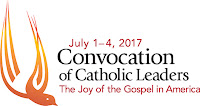There must be a clerical problem in the offices of the
Catholic diocese of Saint Augustine. Somehow, my name ended up on the bishop’s
list of delegates to the USCCB Convocation of Catholic Leaders beginning
Saturday in Orlando. I am keeping my head down, though, hoping no one will
notice me, because it sounds as though it could be really cool.
 |
|
The convocation is designed to be a give-and-take
exchange of ideas between bishops, clergy, and lay leaders. |
The purpose
is to discuss different strategies for implementing the Church’s emphasis on
New Evangelization. Pope Francis has made this drastic transformation of the
Church one of his most important priorities. “‘Mere administration’ can no
longer be enough,” the pontiff writes in Evangelii Gaudium (Joy of the Gospel) (25),
quoting the Fifth General Conference of Latin American and Caribbean Bishops.
“Throughout the world, let us be ‘permanently in a state of mission.’”
I may be way
off base, but I'm sensing a little cognitive dissonance here. Doesn’t it seem
that asking Catholic bishops to change gears so drastically is about the same as
expecting a limousine to win a funny car sprint?
This New Evangelization isn’t really new; the only “new” aspect is the emphasis on
it. It was one of the many initiatives proposed by the Second Vatican Council.
Other issues needed more immediate attention; other changes needed time to assimilate. That's why it
took nearly 50 years – historically, not long for the Vatican – for its time to come. And now that the issue has
become a papal priority, a lot of people across the board are starting to
squirm.
 |
|
Archbishop
Jose Octavio Ruiz Arenas, head of the Pontifical
Council for Promoting New Evangelization, was invited by Bishop Felipe Estevez to address clergy and lay leaders in the Diocese of St. Augustine in 2015. |
Most of the faithful will be far from comfortable with it. Many
believe our faith is our business, and that we have no business getting into
anyone else’s business. A study by the Catholic Leadership Institute found that
only 6 percent of American Catholics place a high priority on evangelization.
That figure for protestants is 75 percent. But our discomfort with any change
regarding religion cuts closer to the core of our being.
One element that draws man to religion is stability – God
is the same yesterday as He is today and will be tomorrow. In our 21st
century age of uncertainty, we grasp at any stable influence we can find. Give
me that old-time religion because it’s the last thing we want changed. We need
that solid touchstone of church on Sunday to escape from the rest of the week.
Bishops, by the very requirements of their position, also
prefer
stability. As the leaders of the flock, it’s their responsibility to ensure
fidelity to the tenets of the faith. In other words, in a religion with a
hierarchical tradition, their role has been to maintain order, not shake
things up. Yet, this New Evangelization seems to be asking bishops to do an
about-face and work counter to fulfilling their responsibilities. Who would be
comfortable doing that?
But here’s the cognitive dissonance – Jesus was absolutely
not about making anyone comfortable. He was seditious, a radical revolutionary,
a rhetorical bomb-thrower who targeted the power structure personally, calling the
chief priest and members of the Sanhedrin a brood of vipers (Mt 23:33) and hypocrites and
who won’t enter heaven nor “allow entrance to those trying to enter” (Mt 23:13). Yet, believing they
were the righteous guardians of the faith, executing Jesus was not just
justified, it was justice.
 |
|
Bishop Felipe
Estevez of the Diocese of St. Augustine
considers the New Evangelization process to be critical to the future of the Church. |
And now Pope Francis is asking our religious leaders – our
guardians of the faith – to follow his example and become the rhetorical bomb-throwers
of our time. How many bishops will be able to shift gears so drastically? That
question alone would make the convocation wonderfully attractive.
One bishop who has embraced the new emphasis on evangelization is Felipe
Estevez, bishop of the Diocese of St. Augustine. Bishop Estevez has asked
clergy and lay leaders alike to leave their comfort zones by training them to create
a “community of missionary disciples.” The initial goal is to help people develop
a true relationship with Jesus so they might be transformed from “casual
Catholics” to active members of vibrant faith communities – even if it means
going to unusual places and using unfamiliar means.
“We must be bold enough
to discover new signs and new symbols,” Pope Francis writes in Evangelii Gaudium (167), “new flesh to
embody and communicate the word, and different forms of beauty which are valued
in different cultural settings.” Bishop Estevez was one of the first to accept
the challenge. I’m looking forward to seeing how many of his brother bishops
are equally committed to throw these rhetorical bombs. I’ll even raise my head
to see.
No comments:
Post a Comment